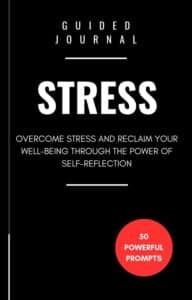In the hustle and bustle of our modern lives, stress has become an unwelcome companion. We navigate through deadlines, responsibilities, and expectations, often feeling overwhelmed and drained. It’s no wonder that stress management has become an essential skill in today’s world.
But how can we find solace amidst the chaos? How can we navigate the stormy seas of stress and find a sense of peace and tranquility? The answer lies within the pages of a journal.
Welcome to a journey of self-discovery and stress relief. In this article, we present you with 50 thought-provoking journal prompts that will guide you towards a path of inner calm and mental well-being.
These prompts are not just mere words on paper; they are powerful tools that will unlock the depths of your mind, allowing you to explore your emotions, fears, dreams, and desires. They will encourage you to reflect, grow, and find the strength to overcome stress.
So grab a pen and a journal, and let the journey begin. Together, we will delve into the realms of self-reflection, gratitude, mindfulness, and resilience. We will unravel the layers of stress and discover the hidden gems of serenity within.
Are you ready to embark on this transformative adventure? Let’s dive in and explore the profound impact that journaling can have on stress relief and management.
Understanding Stress: Unraveling the Impact of Modern Life
Defining Stress – Beyond Everyday Worries
Stress is an integral part of our lives, but what exactly is it? At its core, stress is the body’s response to any demand or threat, whether real or perceived. It is our physiological and psychological reaction to external pressures that disrupt our equilibrium. While occasional stress can be motivating, chronic stress can have detrimental effects on our physical and mental well-being.
Identifying the Sources – A Multifaceted Enemy
Stress can originate from various sources, such as work-related pressures, financial burdens, relationship issues, health concerns, or major life changes. Each individual may experience stress differently, influenced by their unique circumstances and coping mechanisms. For example, a looming deadline, an upcoming exam, or the demands of caregiving can trigger stress responses.
The Impact – Affecting Mind, Body, and Behavior
Stress affects us holistically, impacting our mind, body, and behavior. Mentally, stress can lead to anxiety, irritability, difficulty concentrating, and even depression. Physically, stress activates the body’s fight-or-flight response, releasing stress hormones like cortisol, which can result in increased heart rate, elevated blood pressure, and weakened immune system. Behaviorally, stress may manifest as overeating, substance abuse, withdrawal from social activities, or difficulty sleeping.
Recognizing the Warning Signs – Your Body’s S.O.S.
To effectively manage stress, it is crucial to recognize the warning signs. Pay attention to physical cues like headaches, muscle tension, digestive issues, or fatigue. Emotional indicators, such as mood swings, feeling overwhelmed, or loss of interest, should not be ignored. Behavioral changes like increased procrastination, decreased productivity, or social withdrawal can also indicate stress overload.
Coping Strategies – Navigating the Storm
Now that we understand stress better, let’s explore practical coping strategies to navigate its stormy waters. Engaging in regular physical activity, practicing relaxation techniques like deep breathing or meditation, maintaining a healthy lifestyle, and seeking social support are effective ways to manage stress. Additionally, time management, setting realistic goals, and adopting a positive mindset can help alleviate stress and build resilience.
Stress is an inevitable part of life, but with awareness and effective coping strategies, we can minimize its negative impact. By understanding the factors contributing to our stress and implementing healthy habits, we empower ourselves to lead more balanced and fulfilling lives. Remember, self-care and self-compassion are essential in this journey. Embrace the power to conquer stress and thrive.

The Transformative Power of Journaling: Your Path to Stress Relief and Management
What is Journaling?
Journaling is a personal practice that involves regularly writing down your thoughts, feelings, and experiences in a dedicated journal or notebook. It is a safe space where you can freely express yourself without fear of judgment. Whether you choose to write in prose, poetry, or bullet points, there are no rules – only the freedom to explore your innermost thoughts.
The Transformative Benefits of Journaling
Emotional Release: Journaling provides a cathartic release, allowing you to unload your thoughts and emotions onto paper. By externalizing your internal turmoil, you create space for healing and clarity.
Stress Reduction: Writing in a journal can help you identify and analyze stress triggers, enabling you to develop effective coping mechanisms. By acknowledging your stressors, you gain a sense of control and can implement strategies to reduce their impact.
Self-Reflection and Self-Discovery: Through journaling, you gain a deeper understanding of yourself. By reflecting on past experiences and observing recurring patterns, you can identify personal strengths, weaknesses, and opportunities for growth.
Problem Solving: Journaling acts as a problem-solving tool, allowing you to brainstorm solutions, weigh pros and cons, and explore different perspectives. By untangling complex thoughts and emotions, you can gain clarity and make more informed decisions.
Enhanced Creativity: Engaging in the creative act of writing stimulates your imagination and enhances your creative thinking. Journaling can serve as a fertile ground for new ideas, inspirations, and insights.
Improved Mental Health: Regular journaling has been linked to improved mental health outcomes, such as reduced symptoms of anxiety and depression. It provides a private space for self-care, self-expression, and self-compassion.
How to Start Journaling
Choose the Right Journal: Find a journal that resonates with you. It could be a simple notebook, a beautifully designed guided journal, or even a digital journaling app. The key is to select a medium that encourages you to write consistently.
Set Aside Time: Dedicate a specific time each day or week to journaling. Whether it’s in the morning to set intentions for the day or in the evening to reflect on your experiences, create a routine that works for you.
Create a Safe Space: Find a quiet and comfortable environment where you can fully immerse yourself in the journaling process. Eliminate distractions and allow yourself to be present in the moment.
Start Writing: Begin with a simple prompt or write freely – there are no right or wrong ways to journal. Let your thoughts flow without judgment or self-editing. Remember, this is your personal space for self-expression.
Be Consistent: Journaling is most effective when practiced regularly. Aim to write consistently, even if it’s just a few minutes a day. Over time, you’ll witness the cumulative benefits of your commitment.
Congratulations! You now have a comprehensive understanding of journaling and its transformative benefits for stress relief and management. By incorporating journaling into your life, you embark on a journey of self-discovery, emotional release, and personal growth. So grab a pen and journal, and let your thoughts take flight on the pages before you. Your path to a more centered and stress-free life begins now. Happy journaling!

Journal Writing Prompts for Stress Relief and Management
Describe a moment when you felt extremely stressed. What factors contributed to that stress? How did you overcome it?
Reflect on your day-to-day routine. What activities or aspects of your current lifestyle contribute to your stress levels?
How does stress manifest in your body physically? What are the signals that you need to slow down and take a break?
Write about a time where you successfully managed your stress. What strategies did you implement? What was the outcome?
What are some stress-relieving activities that you wish you had more time for in your daily routine?
How does your diet contribute to your stress levels? What changes can you make to your eating habits to help manage stress?
Imagine a completely stress-free day. What does it look like?
How does your environment (home, work, etc.) contribute to or alleviate your stress levels?
What is your “go-to” method for relieving stress? Why does it work for you?
Write about a stressful situation that you’ve been avoiding. What steps can you take to resolve it?
How does technology contribute to your stress levels? What boundaries could you set to reduce this stress?
Discuss the role of exercise in your stress management. How does physical activity help you cope?
Write about a time when you felt overwhelmed with stress, but couldn’t pinpoint the source. How did you navigate this situation?
Describe the most peaceful place you’ve ever been to. How can you recreate aspects of this place in your everyday life?
How does your sleep pattern influence your stress levels? How can improving your sleep help manage stress?
Discuss a book, movie, or song that helps you de-stress. What about it brings you solace?
Write about a person in your life who helps you manage stress. How do they support you?
Reflect on how chronic stress has affected your mental health. What steps can you take to safeguard your psychological well-being?
Write a letter to stress, expressing how it affects you and how you plan to manage it.
How can you incorporate mindfulness or meditation into your daily routine to manage stress?
Describe a stress-induced dream you’ve had. What might it be telling you about your stress levels?
How can you improve your work-life balance to reduce stress?
Discuss a time when stress actually motivated you to perform better. How can you harness stress positively?
Reflect on a habit that increases your stress levels. How can you work on changing this habit?
How does your social life impact your stress levels? Can making changes in your social circle help manage stress?
Write about a hobby or pastime that you find therapeutic. How does it help you with stress relief?
How does the news or current events contribute to your stress levels? How can you consume media mindfully?
Reflect on a time when you turned to unhealthy coping mechanisms to handle stress. How can you avoid this in the future?
Discuss the role of self-care in your stress management. What self-care practices work best for you?
How does your inner dialogue contribute to your stress levels? Can changing your mindset help manage stress?
Write about an instance where you helped someone else manage their stress. What did you learn from this experience?
How does financial stress affect your overall well-being? What steps can you take to alleviate this stress?
Discuss how spending time in nature can help reduce stress. How can you incorporate this into your routine?
Reflect on a stressful period in your life. How have you grown from this experience?
How does your relationship with your body impact your stress levels? How can you improve this relationship for better stress management?
Write about a time when you used creative expression (art, music, writing, etc.) to alleviate stress. How did it help you?
Discuss the role of humor and laughter in stress relief. How can you incorporate more joy into your life?
How does your relationship with time contribute to your stress levels? How can you improve your time management skills?
Reflect on a mantra, quote, or piece of advice that helps you manage stress.
Write about a stress-relief product (like aromatherapy, weighted blanket, etc.) that you’ve found beneficial.
How does helping others or volunteering help in relieving your stress?
Discuss the role of pets or animals in your stress relief journey. How do they help you?
Reflect on a time when you felt at peace with your stress. How did you achieve this state of mind?
Write about a place you’d like to visit for a stress-relief vacation. Why did you choose this place?
How does your cultural or societal background influence your stress levels and how you manage it?
Reflect on a significant life change (like moving, a new job, etc.). How did you manage the stress associated with it?
Write about a time you felt stressed but chose to suppress it. How did it impact you later?
How do your relationships or interpersonal dynamics contribute to your stress levels? How can you improve these relationships for better stress management?
Discuss the role of spirituality or religion in your stress management. How does it help you cope?
Reflect on your journey with stress management so far. What have you learned about yourself?
Download Printable Journal Prompts (PDF) >>
Guided Journal for Stress Relief & Management
50 Powerful Writing Prompts to Overcome Stress and Reclaim Your Well-Being Through the Power of Self-Reflection

Are you tired of feeling overwhelmed, anxious, and stressed out? Do you long for a way to regain control of your emotions and find inner peace? Look no further. The Guided Journal for Stress Relief & Management is here to guide you on a transformative journey towards a calmer, more balanced life. Through the power of self-reflection and effective stress management techniques, this journal serves as your trusted companion in conquering stress and reclaiming your well-being.
Say Goodbye to Stress Overload:
In today’s fast-paced world, stress has become an all too familiar companion. From demanding work schedules to personal responsibilities, stress can often feel overwhelming. The constant pressure can negatively impact your mental and physical health, leaving you feeling exhausted and burnt out.
Anxious Thoughts Taking Over:
Anxiety often accompanies stress, causing a never-ending loop of worry and unease. Sleepless nights, racing thoughts, and a constant feeling of restlessness can disrupt your daily life and hinder your ability to enjoy the present moment.
Struggling to Find Effective Solutions:
You may have tried various methods to manage stress, but none seem to provide lasting relief. Traditional stress management techniques may fall short in addressing the root causes of your stress, leaving you searching for a more holistic and effective solution.
The Vicious Cycle of Stress:
Imagine waking up every day with a knot in your stomach, dreading the challenges that lie ahead. The constant pressure and overwhelming responsibilities consume your thoughts, leaving you feeling trapped in a never-ending cycle of stress. It’s time to break free.
Anxiety Holding You Back:
Picture yourself unable to fully engage in the present moment, constantly burdened by anxious thoughts that overshadow even the simplest joys in life. The weight of anxiety prevents you from seizing opportunities and embracing new experiences.
Frustration with Ineffective Solutions:
You’ve read countless self-help books, attended workshops, and sought advice from experts, but the relief you seek remains elusive. The frustration of trying and failing to find a solution only adds to your stress, leaving you feeling stuck and hopeless.
Your Path to Inner Peace:
The Guided Journal for Stress Relief & Management is not just a book; it’s a powerful tool designed to help you navigate the complexities of stress and find inner peace. By providing a structured framework for self-reflection, this journal empowers you to uncover the underlying causes of your stress and develop effective strategies to manage it.
Harness the Power of Self-Reflection:
Through thought-provoking prompts, this journal encourages deep introspection and personal growth. You’ll gain a deeper understanding of your triggers, learn to reframe negative thoughts, and cultivate a sense of gratitude and resilience.
Don’t let stress dictate your life any longer. Embrace the transformative power of self-reflection and take control of your well-being with the Guided Journal for Stress Relief & Management. This journal is your roadmap to a calmer, more balanced life—an invitation to discover inner peace and overcome stress once and for all. Start your journey today and unlock the limitless potential within you.
As we come to the end of this exploration into the world of journaling for stress relief and management, take a moment to reflect on the power of self-reflection and vulnerability. Through the simple act of putting pen to paper, we have unearthed the depths of our emotions, confronted our fears, and embraced our dreams. We have discovered that amidst the chaos of life, there is always a sanctuary within ourselves.
Now, armed with these 50 thought-provoking journal prompts, you have the tools to navigate the stormy seas of stress.
Embrace the practice of journaling as a lifelong companion on your journey towards inner peace and mental well-being. Let your journal be a safe haven where you can pour out your thoughts, hopes, and fears without judgment. Allow it to be a mirror that reflects your true self, reminding you of your resilience and strength.
Remember, stress is not a battle to be won or a foe to be defeated. It is a part of the human experience, a reminder that we are alive and engaged in the world.
So, as you close your journal, take a moment to ask yourself: How can I embrace stress as a catalyst for growth and transformation? How can I find balance amidst the chaos?
The answers lie within you. Trust the process, believe in yourself, and let the words on these pages guide you towards a life of serenity and fulfillment.

